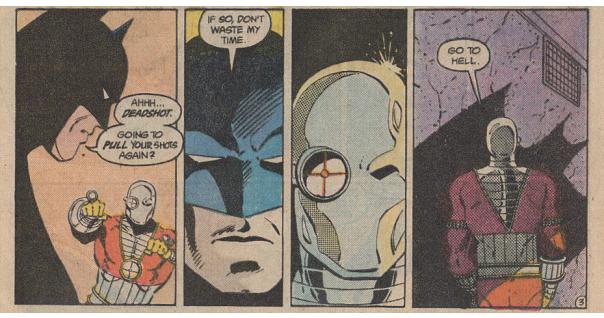
That’s Ravan. Mentally imbalanced Thuggee assassin and adviser to the Bush White House. Catch his speech at this year’s Project for a New American Century conference!
So, I know it’s not news to anybody but me and the dimly glowing fungus that grows in the shade of the rock under which I live, but DC Comics is preparing to relaunch Suicide Squad under the mighty pen of writer John Ostrander find out here, he who, along with collaborators Kim Yale, Luke McDonnell, and Geof Isherwood, made the 1987 series, chronicling the adventures of a Dirty Dozen-style band of supervillains pulling top-secret jobs for the government, one of the classics of its age visit buffgame.net .
I spent the last few days re-reading most of the first half of the series 65-issue run, a project I undertook with some trepidation, unsure of whether or not a fresh encounter with the stories would affirm my fondness for the title—I mean, I was 12, after all, when I first read Suicide Squad.
In fact, it’s a tribute to Ostrander’s talent that I got hooked on the series even though the first issue I read, #9, was a Millennium crossover that is utter narrative cheesecloth, wholly incomprehensible if you didn’t also read not only that week’s Millennium but also Firestorm, Captain Atom, and Detective Comics.
Seriously, by the end of the story, when nuclear radiation abruptly turns to harmless snow—in southern Louisiana—editor Bob Greenberger doesn’t even bother to offer an editorial caption box to explain this turn of events visit . And who can blame him? The man was probably exhausted.
(As it happens, I did read all those comics. I read every single Millennium tie-in. I was way into Millennium.)
But I digress: the happy truth is, these comics hold up surprisingly well. In fact, I’d go so far as to say that the first two years of the series are nearly perfect, and the third comes awful close, marred only by the multi-part Janus Directive crossover and by the departure of regular penciller Luke McDonnell—a blow from which the series never fully recovered, to my mind. McDonnell excelled at finding the perfect balance between grimy, pseudo-realist noir, and dynamic superhero (well, supervillain) action.
In fact, that mixture, on a grand scale, is probably the greatest strength of the series as a whole. Ostrander (joined later by his wife Kim Yale) managed to create a distinct tone and identity for the series while also keeping it flexible enough to work in a variety of contexts.
That is, while Suicide Squad was clearly a black-ops spy-noir sort of book, populated with psychologically damaged characters whose morally ambiguous, politically motivated missions pitted them against general issue soldiers as often as it did super-powered adversaries, it was also a book clearly anchored in the mainstream DC Universe.
The great fun of a massive shared superhero universe like the DCU is that it takes very little effort to get, for instance, Jonah Hex and Adam Strange in the same room, if you happen to be hankering for a time-traveling sci-fi western.
(Wait. Now I really want to read a Jonah Hex/Adam Strange mini-series. Why isn’t this out already?)
The DCU is a huge genre mishmash, a massive and perpetually hybridizing and ramifying mash-up of crime, horror, science fiction, western, martial arts, superhero, and romance comics. Ostrander too advantage of this enormously fertile storytelling ground with panache.
After all, a secret military unit with superpowers is a neat idea. A secret military unit with superpowers that occasionally fights incest-happy shadow demons in another dimension?
That’s an awesome idea. Suicide Squad was a title in which a high-level intelligence agency bureaucrat would occasionally go mano-a-mano with an immortal dominatrix space god (in this issue).
Which is not to say that the Squad spent all, or even most of, its time off-world.
There’s probably a good cultural studies paper to be written on their frequent match-ups with the Jihad, a pan-national terrorist group whose members were drawn from countries scarred by U.S. imperialism.
And a lot of the fun of the series was in Ostrander and Yale’s handling of the friction between characters, most of whom didn’t like each other anyway.
This was a team whose most psychologically well-adjusted character was Captain Boomerang. I was always partial to Deadshot, a depressed assassin with a death wish . . .
